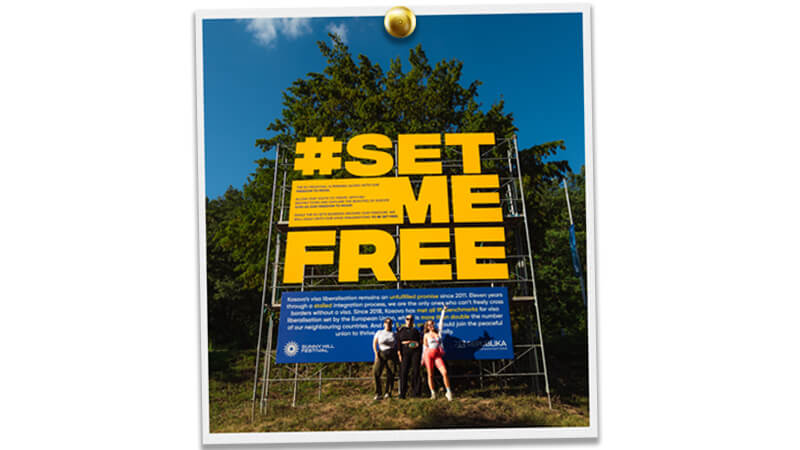#SetMeFree: Will 2024 See Kosovar Citizens Finally Granted Their Freedom Of Movement?
Kosovo is a country that is practically synonymous with youth: it has just celebrated its 15th birthday, and half its population is under the age of 27. Since declaring independence from Serbia in 2008, integration into Europe has been at the top of the country’s political agenda. Tied to it is the long-standing issue of visa liberalisation. Once realised, it would allow citizens to enter the European Union without a visa for a period of up to 90 days. The EU has proposed a date of January 2024 for visa liberalisation, though many remain sceptical given the EU’s track record of serial postponements.
Kosovo’s path to visa-free travel first began in 2012 and, despite having met a laundry list of conditions since 2018, little hope for progress had been made until now. Some EU countries continue to oppose its bid to join the visa-free regime and Kosovar citizens – young people in particular – have suffered the consequences.
It was in light of these challenges that Sunny Hill Festival announced the #SetMeFree campaign. Dukagjin Lipa, the founder of the annual music festival in Prishtina (and the father of Service95 founder Dua Lipa), came up with the idea to use the festival platform to spotlight the issue and urge decision-making bodies to drop the visa requirements. Festival goers wore wristbands emblazoned with the hashtag and social media lit up with support.
Sunny Hill itself was created to bring international talent and entertainment to a youth that would otherwise not have access to it, especially as investment in arts and culture in Kosovo is lacking. “What we can export is music, art, culture and sports,” Lipa says. “These are our ambassadors.”
For Kosovo’s youth, the ‘Set Me Free’ slogan encapsulates widespread feelings of powerlessness and the profoundly human need to go beyond the limits of one’s own country to trade ideas and experiences with peers abroad.
Last summer, Mexhid Ramusa, director of the Movement for Democracy, staged a protest in front of the EU office in Prishtina along with several other activists. Here, they erected a prison to represent the isolation Kosovars face. “We are treated like second-class citizens,” explains Ramusa. “[And] we can’t gain knowledge.” Such restrictions, he believes, hold Kosovars back from realising their potential.
Kosovo is the only country among its neighbours that still does not enjoy the right to move freely. Right now, applying for a visa is a time-consuming, onerous, and costly process that often ends in frustration and rejection.
With an acceptance letter in hand to join a course on media literacy in Germany, Elion Kollçaku, a journalist based in Prishtina, had to secure a visa to attend. “The issue was that I couldn’t even get an appointment to apply for the visa,” Kollçaku says. “It was that hard.” It was an opportunity he had earned but, due to the restrictions, would ultimately miss out on.
Apart from empowering youth, visa-free travel carries the promise of intercultural exchange, plus greater opportunity and essential progress across all sectors of society. Marigona Shabiu, executive director of the Youth Initiative for Human Rights, recalls her own experience of applying for a visa to travel to Spain when she was 18 years old, when the closest Spanish embassy was in the Republic of North Macedonia, 60 miles from where she was at the time. But she has no regrets. “Going to Skopje to apply for the visa – which then enabled me to go to Spain – was the best decision of my life,” she said. “It opened up so many doors for me.”
Travel to the EU, says Shabiu, afforded her access to training sessions and conferences, and helped her to grow both personally and professionally. When she returned home, her experience brought further benefits to the community.
The announcement of visa liberalisation in 2024 is largely considered a huge breakthrough. For many citizens who lie in wait, it is hard not to see this as yet another empty promise, but there is some hope. And once this human right is granted, Lipa believes, “Europe is going to benefit immensely from the creativity of our youth.”
Suzana Vuljevic is a culture writer, editor and translator, and her work has appeared in AGNI, Eurozine and more




